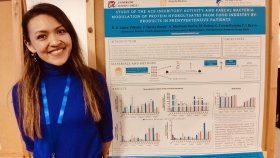Fabiola Consuelo García Reyes


PhD Programme: Nutrition and Metabolism
Research group: Nutrigenomics Research Group
Supervisors: Manuel Suárez Recio & Cristina Torres Fuentes
Bio
Fabiola García holds a bachelor's degree in Biopharmaceutical chemistry from the Benemérita Universidad Autónoma de Puebla, Mexico (2017). During her time as a bachelor student, she joined the Neuropharmacology group and then the Neurophysiology and behavioral department where she participated in two projects focusing on Parkinson's disease and epilepsy research. Afterwards, she received a master's degree grant from the National Ministry of Science and Technology (CONACYT) from the Mexican government. She followed the Molecular Medicine and Innovative Treatment master's program at the University of Groningen in the Netherlands with a specialization in the Neuroscience field. During her master's degree she performed a research internship in the Molecular pharmacology department where the focus of her project was to study peripheral inflammation in Parkinson's disease using cell cultures. Afterwards, as a secondment, she joined the Biochemistry and Molecular Biology group at the UAB, where she worked with micro RNAs involved in the early development of Alzheimer's disease. After finishing her master's degree, she decided to deepen her knowledge of the gut microbiome and metabolism field, studying the alterations and its regulation to target different metabolic disorders, making the nutrigenomics group the perfect match for continuing her academic career.
Project: Effects of phenolic compounds on alterations caused by disruption of the circadian rhythm
Circadian rhythms are essential for maintaining and regulating vital processes that allow the survival and adaptation of the organisms against environmental changes. The regulation of the circadian rhythms is controlled by a central clock located in the hypothalamus and various peripheral clocks localized in different organs, both coordinated by molecular signals ruled by clock genes. In recent years, the use of nutritional strategies such as phenolic compounds have been described as modulators of the regulatory mechanisms of the biological clocks. The use of these phenolic compounds could have an important impact in the prevention or attenuation of several metabolic diseases triggered by the disruption of circadian rhythms which has become a more common problem nowadays due to the modern lifestyle that society has adopted. The objective of the project is to evaluate the phenolic compounds capacity to prevent or ameliorate metabolic diseases caused by the disruption of the circadian rhythm. To achieve our goal, as a first step, Grape Seed Protoanthocyanidins Extract (GSPE) will be administered in a chronical manner to a disrupted circadian rhythm- rat model to evaluate the impact of the extract on different metabolic processes. Finally, we will validate our data by carrying a pilot study with workers who have been shifting turns for more than 5 years. We will evaluate the effect of the chronic consumption of GSPE on humans with disrupted circadian rhythms and potential metabolic disorders.
Outreach activities
- European Researchers' Night 2023. European Corner: "Effects of phenolic compounds on alterations caused by disruption of the circadian rhythm".



